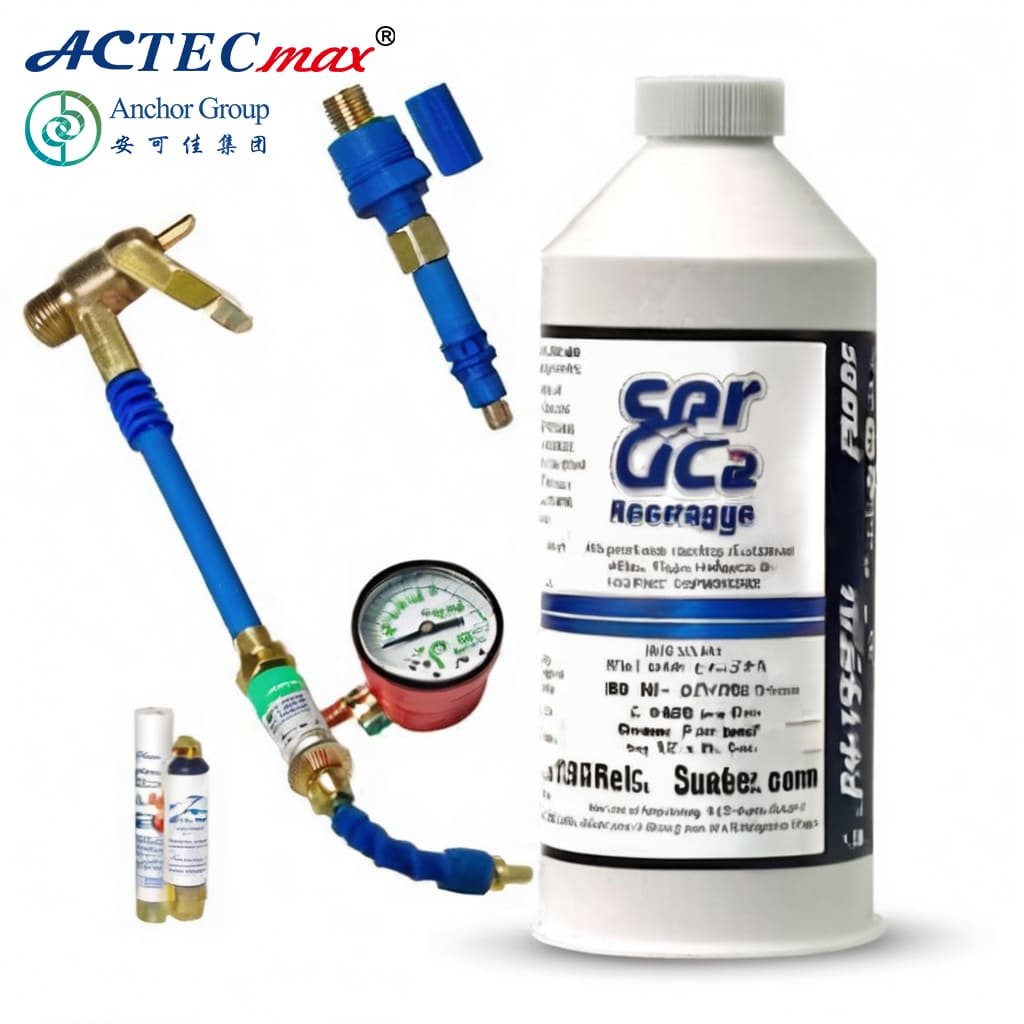
Refrigerantes para automóveis: o ar condicionado de van tem freon?
Quando se trata de entender o tipo de refrigerante usado no sistema de ar condicionado do seu veículo, muitas pessoas ainda associam o termo “Freon” a todos os sistemas de A/C automotivos. No entanto, se você está se perguntando, o ar condicionado da van tem Freon? e o que são refrigerantes automotivos, você veio ao lugar certo. Nesta postagem do blog, esclareceremos essas questões e exploraremos a evolução dos refrigerantes usados em modernos condicionadores de ar de veículos.
Freon é o nome comercial de um grupo de refrigerantes que foram comumente usados em sistemas de ar condicionado por muitos anos. Fréon originalmente referido a CFC-12 (clorofluorcarbono), um refrigerante conhecido por sua eficiência, mas também por seus efeitos nocivos à camada de ozônio. Devido aos riscos ambientais, o uso de CFC-12 foi eliminado globalmente pelo Protocolo de Montreal, o que levou ao desenvolvimento de refrigerantes alternativos.
Hoje, Fréon é frequentemente usado como um termo genérico para refrigerantes na cultura popular, mas a realidade é que os sistemas modernos de ar condicionado, incluindo aqueles em vans, usam diferentes tipos de refrigerantes que são muito mais ecológicos do que o Freon do passado.
A resposta curta é não, mais moderno sistemas de ar condicionado para vans não use mais Freon. Enquanto Fréon (CFC-12) era o refrigerante padrão para condicionadores de ar de carros e vans no passado, mas foi descontinuado na década de 1990 devido aos seus efeitos nocivos à camada de ozônio.
No lugar do Freon, veículos mais novos, incluindo vans, usam refrigerantes como R134a e R1234yf. R134a tornou-se o padrão da indústria depois CFC-12 foi banido, e R1234yf agora está sendo adotado em veículos mais novos devido ao seu potencial de aquecimento global (PAG) muito menor.
Por isso, sistemas de ar condicionado para vans não contém mais Fréon. Em vez disso, eles usam refrigerantes como R134a ou o mais moderno R1234yf, ambos significativamente mais ecológicos do que o Freon usado no passado.
Aqui está uma rápida análise de como refrigerantes automotivos evoluíram:
A principal razão Freon (CFC-12) não é mais usado em sistemas de ar condicionado para vans é o seu impacto devastador sobre o camada de ozônio. A camada de ozônio protege a Terra da radiação UV prejudicial, e foi demonstrado que CFCs como o Freon destroem essa camada.
Em resposta às crescentes preocupações ambientais, acordos globais como o Protocolo de Montreal determinou a eliminação gradual dos CFCs. Como resultado, R134a foi introduzido como uma alternativa mais amiga do ambiente. No entanto, à medida que as preocupações com o aquecimento global aumentaram, R1234yf, um refrigerante com teor ainda menor potencial de aquecimento global, começou a substituir o R134a nos modelos de veículos mais recentes.
Para determinar se o sistema de ar condicionado da sua van usa Fréon, R134a, ou R1234yf, você pode verificar algumas fontes diferentes:
Se sua van foi fabricada antes de meados da década de 1990, ela ainda pode usar Freon (CFC-12), mas isso é altamente improvável em veículos modernos. Se sua van usa R134a ou R1234yf, tenha certeza de que essas são opções muito mais ecológicas.
Usando o correto refrigerante automotivo é crucial garantir que o seu sistema de ar condicionado para van funciona de forma eficaz e eficiente. Usar o refrigerante errado pode danificar o sistema de A/C, levando a um desempenho de resfriamento ruim, custos de reparo mais altos e potenciais danos ambientais.
Para manter o seu ar condicionado de van funcionando perfeitamente, é essencial manter o sistema regularmente. Aqui estão algumas dicas:
Para concluir, sistemas de ar condicionado para vans não uso mais Fréon. A mudança do Freon para refrigerantes mais ecológicos como R134a e R1234yf reflete os esforços contínuos para reduzir o impacto ambiental dos sistemas de ar condicionado dos veículos. Entendendo a evolução de refrigerantes automotivos e as mudanças nas regulamentações ao longo do tempo ajudarão você a se manter informado sobre o sistema de ar condicionado do seu veículo e sua manutenção.
Se você ainda está perguntando, a van AC tem Freon, a resposta é não — e com os refrigerantes mais novos e ecológicos em uso hoje em dia, isso é uma boa notícia para o meio ambiente.
Certifique-se de verificar o seu sistema de ar condicionado do veículo para obter o refrigerante correto, faça a manutenção adequada e mantenha-se fresco durante os meses quentes sem comprometer o futuro do planeta.